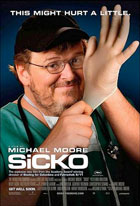 Director: Michael Moore
Director: Michael Moore
Duration: 113 minutes
Year: 2007
Key words: Health care systems, health insurance, poverty
Summary: Michael Moore investigates the American healthcare system, comparing it to that of other countries.
Degree of public health theme coverage: The key health system issues covered in this documentary include:
- The large number (50 million) of Americans without health insurance cover, including those with risk factors or existing health problems.
- The problems for those who are covered by health insurance (eg, extra costs to pay, inadequate coverage, denial of coverage for certain treatments, the need for pre-approval eg, of an ambulance ride). The difficulties of 9/11 rescue workers from New York City getting proper diagnoses and treatment is explored.
- The problems of a profit-driven healthcare system (how there are strong economic incentives to deny care, and to “dump” those who can't pay away from the hospital).
- How vested commercial interests worked to condemn the idea of a universal healthcare system in America as 'socialized medicine' at a time when communism was a threat. 'Socialized medicine' was presented as giving patients and doctors less control and choice over healthcare. The American Medical Council particularly argued against 'socialized medicine'. The efforts of Hillary Clinton to introduce universal care were shown to be blocked by vested commercial interests.
- How the political system is influenced by the American healthcare industry (via lobbyists, payments to politicians, and the movements of senior politicians to work for industry on leaving Congress).
- Many of these issues are contrasted with how universal free care is supposedly provided in Canada, the UK, France and even Cuba. Some of the background to these systems is explored eg, for the National Health System in the UK. The general approach of France to child support, education and health care is considered from various perspectives. These countries seem to have better overall health eg, as measured by infant mortality and life expectancy. Score=5/5
Sophistication of analysis of public health content: There is broad scope and some depth to the arguments. The context and history of the issues is considered. The contrasts with other countries are quite well done, and so are the comparisons with “socialised” areas of US society (the police, the military, the library service etc). But gaps remain – eg, the fact that the USA does has already got a form of universal healthcare coverage for senior citizens (Medicare) is not explored. The idiosyncratic style of the director also may make viewers wonder about the extent of “cherry picking” of certain examples (eg, can Cuban healthcare really be as good as he portrays?).Score=4/5
Potential for empowerment and use of advocacy: An example is given of a doctor (Dr Linda Peno) who makes a court statement (“confession”) about medical reviewers denying insurance cover (with bonuses to those with the highest denial rates).
The director Michael Moore undertakes advocacy stunts eg, taking the group of 9/11 rescue workers to Guantanamo Bay to see if they can receive the free and high quality healthcare offered to prisoners there. He then takes them to Cuba where they receive “full” and “free” treatment. Indeed, the cross-country comparisons can be considered a type of advocacy technique – by showing a different approach is possible.
Moore is also successful in getting one healthcare insurance in changing its decision (ie, when they hear he is onto this particular case). Score=3/5
Persuasiveness of the movie: The case is fairly strongly made that the profit-driven healthcare system has major problems from a public health perspective. The documentary style strengthens the persuasiveness and many different people are interviewed. Nevertheless, as detailed above, the polemic and idiosyncratic style of the director may not be to the taste of some viewers (eg, the possible “cherry picking” of certain examples). Score=4/5
Engagement & cinematic quality: The movie is entertaining and fast paced. These reviewers found it is very amusing in places. Possibly the flow is a bit disjointed in places.Score=5/5
Total score = 22/25
Questions for discussion:
- How genuine do you think the issues raised by this movie are?
- What do you think of this style of documentary for informing debate on the provision of private healthcare?
Other information:
- Extra information is on the DVD that may be of interest to some viewers.
- There is a Wikipedia article on this movie - found here
- There are various Medline-indexed journal articles that discuss aspects of this movie, for example:
- Hacker JS (2007). Healing our Sicko health care system. N Engl J Med; 357(8):733-5.
- Hass J. SiCKO strikes a chord. CMAJ 2007;177:379-380.
- Kao C. Diagnosis: Michael Moore – Media paint filmmaker to be health care system's main problem. Int J Health Services 2008;38:191-3.
- For a published comparison of poorer health status in the USA compared to England see: Banks et al. Disease and disadvantage in the United States and in England. JAMA. 2006 May 3;295(17):2037-45.
- The trailer can be seen on YouTube - found here
- Photo credit: Wikipedia
- Back to Films in Undergraduate Public Health Teaching home page
CONTACT US
Associate Professor Nick Wilson
Department of Public Health
University of Otago, Wellington
PO Box 7343
Wellington South 6242
New Zealand
Tel: +64 4 385 5541 ext 6469
Fax: +64 4 389 5319
Email: nick.wilson@otago.ac.nz